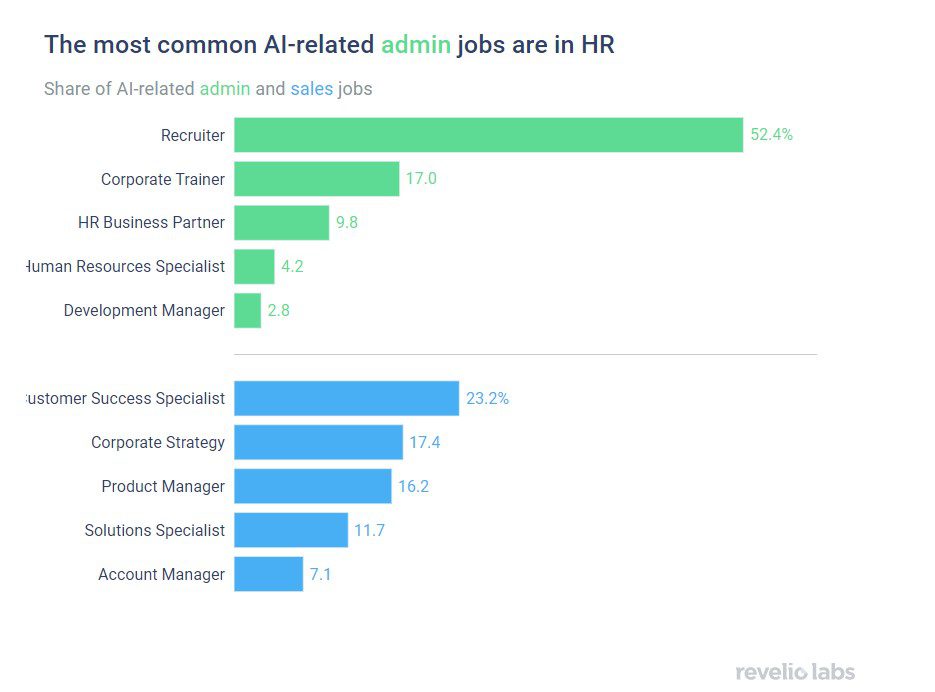Revelio Labs: AI will disrupt HR jobs
But it cannot replace the human in HR.
Why You Should Care
AI is disrupting the world of work.
And Revelio Labs found that HR teams are ahead of the curve in seeing the efficiency benefits of AI.
Here's why should other departments follow HR's lead.
HR leaders, don’t miss out: Join us in Las Vegas for free as a VIP guest at UNLEASH America.
Artificial intelligence (AI) is all over the headlines at the moment.
Everyone is talking about OpenAI’s generative AI technology, ChatGPT – in fact, 25 million people are using ChatGPT on a daily basis.
And now, more than 30,000 tech leaders and experts (including OpenAI co-founder Elon Musk and Apple co-founder Steve Wozniak) have signed an open letter calling for an independent review of giant AI models. The letter has been mired in controversy with many signatories changing their positions, and a few of the signatures turning out to be fake.
AI’s long-term impacts on the labor market, and unemployment rates, remains unclear, but AI technology is already disrupting the world of work.
In this context, Revelio Labs decided to search millions of job descriptions and identified all the adverts that mentioned AI in some way – aka using terms like ‘artificial intelligence’, ‘chatbot’ or ‘neural network’.
Of course, the research found that engineering and scientist jobs will require the most AI skills, but all job types have seen a growth in AI-related terms since 2018.
In fact, administrative roles saw the highest share of AI jobs between 2018 and 2022 (75.6%), compared to 21.9% for finance, 41.7% for marketing and 28.9% for operations roles.
And, interestingly, among those AI-related administrative jobs, the most common roles were in HR.
Revelio Labs economist and author of the report Jin Yan explains why: “A company’s most critical investment is its people, and the pandemic has completely changed how people work.
“It not only accelerated the remote working trend but led to a surge in employee turnover and a new set of expectations for employers.
“The pressure to adapt to these forces put HR teams front and center when it comes to digital transformation and AI integration.”

Credit: Revelio Labs.
HR jobs aren’t at risk to AI
UNLEASH was keen to find out if this disruption of HR jobs by AI is a good or a bad thing. Are HR jobs at risk because of this tech adoption?
It is certainly true that AI can help automate the manual, repetitive tasks currently performed by the HR team. For instance, “during the recruiting process, AI can automate repetitive tasks like screening applications and scheduling interviews”, explains Yan.

Jin Yan, economist, Revelio Labs.
She continues: “AI can also help HR teams predict talent needs by analyzing turnover trends and build a more proactive recruiting practice.
“For existing employees, AI can help HR teams build more personalized career development programs and improve employee engagement using data-backed insights on employee satisfaction and needs.”
Ultimately, this enables HR teams to focus on more human work, as well as become a more strategic partner to the wider business.
As a result, AI “cannot replace the “human” part of human resources. Ensuring ethical and fair recruiting practices and employee management still requires human expertise”, notes Yan.
“Jobs will not be replaced completely, but routine tasks will.”
Clearly HR is leading the way on technology – it is embracing the efficiency savings from AI more than other departments in the business. How can HR teams persuade other teams to learn from their example?
According to Yan, HR and organizations need to become more “open to new ways of thinking and working”, particularly if they want to thrive in the digital future.
In this context, reskilling and upskilling is essential; while they must learn about AI and data skills (and keep these up to date as the technology innovates), organizations must also train their employees and leaders on the downsides of AI like unconscious biases and security challenges.
AI is not something to be scared of – yes, it will completely transform the world of work, but because it frees up workers to be more creative and strategic, “the future of the workplace will become more efficient, more productive, and also more human”, concludes Yan.
The International Festival of HR is back! Discover amazing speakers from the world of HR and business at UNLEASH America on 26-27 April 2023.
Sign up to the UNLEASH Newsletter
Get the Editor’s picks of the week delivered straight to your inbox!

Chief Reporter
Allie is an award-winning business journalist and can be reached at alexandra@unleash.ai.
